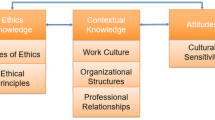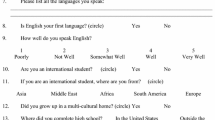Abstract
This study examined the impact of ethics training engagement (i.e., active learning vs. passive learning) on unethical decision-making in the workplace. Participants were randomly assigned to one of the two conditions. Next, a baseline measurement of ethical ideology was collected using the Ethics Position Questionnaire (EPQ) and participants then engaged in ethics training based on the condition to which they were randomly assigned. They then had the option to read along or listen to a hypothetical scenario about an employee faced with the opportunity to make an unethical decision, and completed the Unethical Decision Questionnaire (UDQ). Results showed that participants in the passive learning condition were significantly more likely to perceive an unethical situation as ethical compared to participants in the active learning ethics training condition. Additionally, participants in the passive learning condition were significantly more likely to engage in unethical decision-making than participants in the active learning condition. The current findings contribute to the existing literature by providing evidence that active learning in ethics training programs could reduce unethical decision-making within the workplace.
Similar content being viewed by others
References
Adams, J., A. Tashchian, and T. Shore. 2001. Codes of ethics as signals for ethical behavior. Journal of Business Ethics 29 (3): 199–211.
Bell, B.S., and S.W. Kozlowski. 2008. Active learning: Effects of core training design elements on self-regulatory processes, learning, and adaptability. Journal of Applied Psychology 93 (2): 296–316.
Bommer, M., C. Gratto, J. Gravander, and M. Tuttle. 1987. A behavioral model of ethical and unethical decision making. Journal of Business Ethics 6 (4): 265–280.
Boshoff, E., M. Kotze, and P. Nel. 2014. The development and initial validation of the work convictions questionnaire (WCQ) to measure approaches to ethical decision making in the workplace: Part 2. African Journal of Business Ethics 8 (2): 15–30 ISSN: 1817-7417.
Code of Ethics and Business Conduct. (2019). Retrieved June 2019, from Society for Human Resource Management: shrm.org/ResourcesAndTools/tools-and-samples/policies/pages/cms_014093
Cohen, J., L. Pant, and D. Sharp. 1993. A validation and extension of a multidimensional ethics scale. Journal of Business Ethics 12 (1): 3–26.
Davis, M.A., M.G. Andersen, and M.B. Curtis. 2001. Measuring ethical ideology in business ethics: A critical analysis of the ethics position questionnaire. Journal of Business Ethics 32: 35–53.
Felder, R.M., and L.K. Silverman. 1988. Learning and teaching styles in engineering education. Engineering Education 78 (7): 674–681.
Forsyth, D.R. 1980. A taxonomy of ethical ideologies. Journal of Personality and Social Psychology 39: 175–184.
Greenberg, L., and J. Barling. 1996. Employee theft. In Trends in organizational behavior, (Vol. 3, pp. 49–64), ed. C.L. Cooper and D.M. Rousseau. John Wiley & Sons, Ltd.
Grimm, P. (2010). Social desirability bias. Wiley International Encyclopedia of Marketing.
Helin, S., and J. Sandström. 2010. Resisting a corporate code of ethics and the reinforcement of management control. SAGE journals 31 (5): 583–604.
Henle, C.A., R.A. Giacalone, and C.L. Jurkiewicz. 2005. The role of ethical ideology in workplace deviance. Journal of Business Ethics 56 (3): 219–230.
Hollinger, R., and J.C. Lexington. 1983. Theft by employees. Social Forces 63 (2): 584–586.
Izzo, G. 2000. Compulsory ethics education and the cognitive moral development of salespeople: A quasi-experimental assessment. Journal of Business Ethics 28 (3): 223–241.
Kershner, A.M. 1964. Speed of reading in an adult population under differential conditions. Journal of Applied Psychology 48 (1): 25–28.
Knouse, S.B., and R.A. Giacalone. 1996. The six components of successful ethics training. Business & Society Review 98: 10–13.
Loe, T., and W. Weeks. 2000. An experimental investigation of efforts to improve sales students’ moral reasoning. Journal of Personal Selling & Sales Management 20 (4): 243–251.
Marques, P.A., and J. Azevedo-Pereira. 2009. Ethical ideology and ethical judgments in the Portuguese accounting profession. Journal of Business Ethics 86 (2): 227–242.
McMahon, J.M., and R.J. Harvey. 2007. Psychometric properties of the Reidenbach–Robin multidimensional ethics scale. Journal of Business Ethics 72: 27–39.
Michel, N., J. Carter, and O. Varela. 2009. Active versus passive teaching styles: An empirical study of student learning outcomes. Human Resources Development Quarterly 20 (4): 397–418.
Myles, B.S., M.L. Trautman, and R.L. Schelvan. 2004. The hidden curriculum: Practical solutions for understanding unstated rules in social situations. Autism Asperger Publishing Company.
Noe, R.A. 2017. Employee training and development. New York, NY: McGraw-Hill Education.
Olson, S. D. (2013). Shaping an ethical workplace culture. Retrieved from SHRM Foundation's Effective Practice Guideline Series: https://www.shrm.org/hr-today/trends-and-forecasting/special-reports-and-expert-views/Documents/Ethical-Workplace-Culture.pdf
Prince, M. 2004. Does active learning work? A review of the research. Journal of Engineering Education 93 (3): 223–231.
Reidenbach, R., & Robin, D. (1988). Some initial steps toward improving the measurement of ethical evaluations of marketing activities. Journal of Business Ethics, 7, 871–879.
Sears, D. 1986. College sophomores in the laboratory: Influences of a narrow data base on social psychology's view of human nature. Journal of Personality and Social Psychology 51 (3): 515–530.
Sekerka, L.E. 2009. Organizational ethics education and training: A review of best practices and their application. International Journal of Training and Development 13 (2): 77–95.
Stewart-Wingfield, S., and G. Black. 2005. Active versus passive course designs: The impact on student outcomes. Journal of Education for Business 81 (2): 119–123.
Unemployment rate was 3.6 percent in October 2019. (2019, November 6). Retrieved from U.S. Bureau of Labor Statistics: https://www.bls.gov/opub/ted/2019/unemployment-rate-was-3-point-6-percent-in-october-2019.htm?view_full
Waples, E.P., A.L. Antes, S.T. Murphy, S. Connelly, and M.D. Mumford. 2009. A meta-analytic investigation of business ethics instruction. Journal of Business Ethics 87: 133–151.
Weaver, G., L. Trevino, and P. Cochran. 1999. Corporate ethics programs as control systems: Influences of executive commitment and environmental factors. Academy of Management 42 (1): 41–57.
West, J.P., and E.M. Berman. 2004. Ethics training in U.S. cities: Content, pedagogy, and impact. Public Integrity 6 (3): 189–206.
Author information
Authors and Affiliations
Corresponding author
Ethics declarations
Declarations
This research was conducted as a requirement for completion of the Master of Arts degree in Industrial-Organizational Psychology at Xavier University. The research was funded by Frank G. and Catherine A. Miltz Mini Grant from Xavier University. There are no conflicts of interest to declare that are relevant to the content of this article. Both authors certify that they have no affiliations with or involvement in any organization or entity with any financial interest or non-financial interest in the subject matter or materials discussed in this manuscript. The authors have no financial or proprietary interests in any material discussed in this article. This study was submitted to the Institutional Review Board (IRB) at Xavier University and approved as exempt research. All participants provided informed consent to participate in this study.
Additional information
Publisher’s note
Springer Nature remains neutral with regard to jurisdictional claims in published maps and institutional affiliations.
Rights and permissions
About this article
Cite this article
Singer, S., Diab, D. Ethics education: the impact of ethics training engagement on unethical decision-making in the workplace. International Journal of Ethics Education 6, 109–124 (2021). https://doi.org/10.1007/s40889-020-00114-y
Accepted:
Published:
Issue Date:
DOI: https://doi.org/10.1007/s40889-020-00114-y




